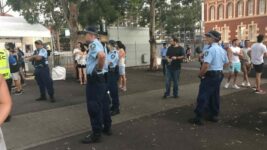Class Action Launched Over Illegal Strip Searches

A class action lawsuit has been launched on behalf of young people who were unlawfully strip searched at the Splendour in the Grass music festival in 2018.
In 2019, the New South Wales Law Enforcement Conduct Commission (LECC) began an investigation into several strip searches conducted by the state’s police officers.
The investigation came in the wake of statistics showing that the number of strip searches has risen 20-fold over the past decade or so in our state, to the point where it has become “routine policing”, and the fact that in more than 80% of cases, strip searches turn up nothing illegal.
Focus on investigation
Given its limited resources, the LECC focused on strip searches of young adults at the 2018 Splendour in the Grass music festival, as well as the strip searching of a 15-year-old boy who was required to lift his testicles, a 16-year-old Aboriginal boy who had his shorts pulled off and forced to squat in a vehicle dock and 16-year-old girl who was asked to remove her panty liner as part of a search.
As part of the investigation, the LECC looked at the practice of strip searches more broadly and in December 2020, its final report identified a number of ambiguities surrounding police protocols regarding searches. Due to these purported uncertainties (although lawyers suggest the fact many of the searches are illegal is apparent) the Commission, whose members include former police officers, suggested that the lawfulness of some of the searches is “debatable”.
No power to discipline or prosecute
It is important to note that the LECC has no power to discipline let alone criminally prosecute police officer – it can only make recommendations for change and potential prosecution.
Indeed it is completely up to prosecutorial bodies such as the NSW Police Service and, potentially, the Office of the Director of Public Prosecutions as to whether an officer will be criminally prosecuted for crimes.
It is also telling that the LECC, due to the insufficiency of its resources, is only able to investigate around 2% of complaints it receives against police officers.
Recommendations for change
As a result of the investigation, the Commission made 25 recommendations for change.
One of these recommendations was for greater clarity regarding strip search protocols and further guidance on when and how they should be conducted, included the parameters of strip search laws.
The recommendations is somewhat surprising given the current law is clear regarding when a strip search can be undertaken, where and how it can be undertaken, and what may amount to an illegal strip search.
The Commission further recommended that their be more comprehensive police protocols regarding the basis for a strip search, as well as better record keeping when officers take it upon themselves to subject a person to the humiliating procedure.
It also recommended of strip searches changes to NSW Police training guides and manuals, with a direction that, in accordance with the law, police “conduct the least invasive kind of search practicable in the circumstances” – such as a “general search” instead of a strip search where possible, and strict specifications about what’s permissible and not during a strip search, such that police are not allowed to touch a person’s breasts, genitals or buttocks during a strip search.
The NSW Police Force has not, as yet, responded to the recommendations, but given its past track record and the attitude of the current Police Commissioner regarding strip searches, some feel there is unlikely to be any substantial change.
Class action being commenced
Given the brazenness of police officers when conducting strip searches and the inaction of police commands when it comes to ensuring officers follow the law, a class action is now being commenced with a view to forcing change and bringing justice to those illegally violated.
One of the lawyers with carriage of the class action told the media.
“We think that people who have undergone an unlawful strip search will be entitled to substantial compensation, so in serious cases, the compensation could be tens of thousands of dollars”.
“We haven’t seen a class action in relation to unlawful strip searches in Australia… so we think this is a really unique and important way to clarify strip search law, and to highlight this issue, and importantly, to get compensation for people who have been impacted by these unlawful searches.”
State-sanctioned sexual assault
For many young people, the experience of being strip searched is degrading and traumatic. It erodes trust in police.
The psychological impacts following a strip search can range from fear, humiliation, distress and depression to aggression and hostility.
One young woman told the NSW Coronial Inquest into drug-related deaths at music festivals that a police officer threatened to make a strip search “nice and slow”, unless she confessed to where her drugs were hidden.
Similarly, a young man who carries an insulin pen for diabetes was strip searched after a positive indication of drugs by a sniffer dog.
Police searched his pockets and shoes and then took him to a demountable building where he was strip searched. He says he left his shirt on, but officers asked him to remove his pants and underwear and bend over.
He says the experience “quite confronting, quite intimidating” and that at no time was he told his rights, or asked for his consent to the search.
What does the law say?
Part 4 division 4 of the Law Enforcement (Powers and Responsibilities Act) 2002 (NSW) (the LEPRA) sets out the strip search powers police have. Section 31 states that a strip search can only be conducted when “the seriousness and urgency of the circumstances” necessitate it.
Section 33 of the LEPRA outlines that these searches must be carried out in an enclosed area and not in view of anybody of the opposite sex. Body cavities can’t be checked. The search shouldn’t involve the removal of any clothing unnecessarily and an officer should never touch an individual.
A refusal to comply with armed officers’ orders to strip down is taken as being motivated by having something to hide – rather than having anything to do with fear, dignity or humiliation – so it’s best to politely comply with instructions.
However, an individual should never give consent to being searched: reason being, if it’s found the search was carried out illegally, then having given consent actually overrides that finding and makes it legal.







